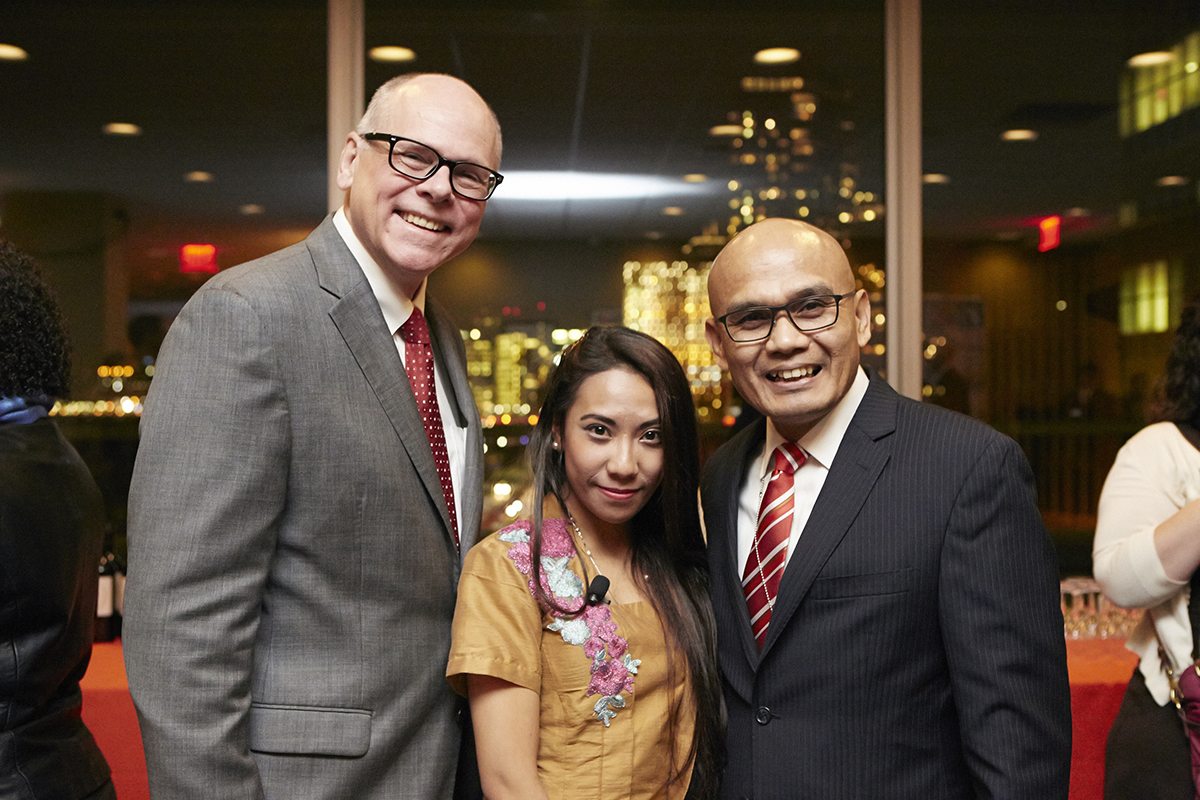Alliance for Science launches hunger conversation at UN
By Joan Conrow

The Cornell Alliance for Science converged on the United Nations Nov. 17 to launch a global conversation about ending world hunger.
As the Manhattan skyline twinkled in the background, the Alliance’s 25 newly graduated global leadership fellows mingled with diplomats, journalists, academics and science allies, sharing the personal stories that prompted them to embrace technological tools in the quest for food security.
The fellows, who represent 10 nations, had just completed a 12-week intensive course in science, communications and grassroots organizing at Cornell. They were the first cohort in a pioneering program conceived by Cornell plant biologist Sarah Evanega and funded by the Bill & Melinda Gates Foundation.
“We must use the tools of science to end the disparity we see around the world,” Evanega told the crowd of 100 people assembled at the gala. “I’d like to work toward ensuring that every parent has the opportunity to put warm, nutritious food in front of their children three times a day, and that every mother can both feed her children and send them to school.”
Representatives from the embassies of Ghana, Indonesia, Uganda and Kenya spoke of the critical need to address world hunger issues and the role that biotechnology can play in advancing agriculture.
“I feel there couldn’t be a better place than the U.N. to begin a conversation, but be careful of the U.N. – sometimes we talk too much and forget implementation in the field,” said Indonesian Ambassador Desra Percaya. “It’s very important.”
The fellows, who returned to their countries last week, will pursue that implementation through campaigns and communication strategies aimed at improving public understanding of the role that biotechnology and science can play in ending hunger.
“Access to agricultural innovations can reduce drudgery, increase productivity and incomes, and ultimately increase opportunities for education,” Evanega said.
“You must get to the villages where people are so you can help them make a difference, because that is where the problem is,” Kenyan goodwill ambassador Peter Rono advised the fellows.
“I have no doubt their efforts will be of great consequence,” said Max Pfeffer, senior associate dean of the College of Agriculture and Life Sciences.
Among those sharing their personal stories were the Rev. Emmanuel C. Alparce of the Philippines, who said that millions of his countrymen are hungry. “I’m here because I believe biotech will improve the lives of my people and my farmers,” he said.
Joni Kamiya told of how her father’s Hawaii papaya farm had been suffering “a slow death” from the ravages of a plant virus until Cornell scientists genetically engineered a virus-resistant variety.
“He accepted this technology to keep our farm going,” she said, noting that now she devotes much of her time to dispelling misinformation about biotechnology on social media. “It’s funny that my little thing on the Internet was helping farmers in Hawaii, and hopefully it will help others around the world.”
Nassib Mugwanya spoke of how farmers in his home country of Uganda are suffering from hunger and economic setbacks because plant viruses are ravaging the essential cassava crop. Scientists have genetically engineered cassava to resist these viruses, but political activists have blocked its introduction.
“Even though the solution is right in front of us, right within our reach, the legislative climate has not been right for ... farmers to have this crop on their farms,” he said.
Jayson Merkley, an Oregon-based researcher with Vegan GMO, told of how he initially had been opposed to biotechnology, but had come to understand that the anti-GMO stance held by most vegans is hindering efforts to address hunger and poverty.
“Despite being good people with the best of intentions, we’re driving a wedge between these biotech tools and the people who need them,” Merkley said.
The Cornell Alliance for Science is now accepting applications for its 2016 Global Leadership Fellows program. For more information visit allianceforscience.cornell.edu/leadershiptraining.
Joan Conrow is a freelance journalist who covers events for the Alliance for Science.
Media Contact
Get Cornell news delivered right to your inbox.
Subscribe